遏制理论之父_乔治_凯南
冷战的形成
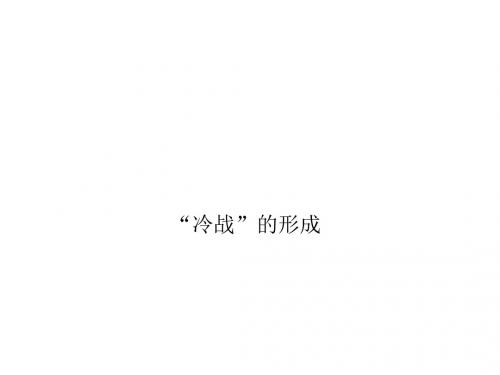
二、“冷战”政策的表现
探究二:美国为达到遏制苏联、称霸世界的目的 具体采取了那些措施?苏联又采取了哪些对抗措 施?请阅读教材完成下表。
领 域 政 治 经
美国
政策措施 苏联
经互会
杜鲁门主义 共产党和工人党情报局 马歇尔计划
北约组织
华约组织
1、政治上: 杜鲁门主义
英国请求美国承担对希土的援助
1947年3月,杜鲁门在咨文 中要求国会授权美国政府向 希腊、土耳其提供4亿美元 的经济援助,并指出“这
马歇尔计划受援国及宣传海报
英法等16国受援, 对西欧的援助达 132亿美元,其中 90%是赠予,10%是 贷款,因此丘吉尔 把“马歇尔计划” 称为“人类历史上 最慷慨的举动” 。
马歇尔计划是杜鲁门主义在经济上的运用, 是杜鲁门主义的延续和扩大,其本质还是 讨 论 遏制苏联。 杜鲁门曾经说过:杜鲁门主义和马歇尔计划是 “一个胡桃的两半”。如何理解这句?杜鲁门 主义和马歇尔计划之间有何关系?杜鲁门主义 和马歇尔计划的实质是什么?
⑵积极影响: ①避免了新的世界大战的爆发 ②客观上两强竞争促进了科技的发展
本 课 小 结
序幕:丘吉尔“铁幕”演说
划
经济
美
杜鲁门主义
政治
共产党和 工人党情报局
苏
约
军事
成
两极格局形成
——冷战的第一次高潮 • 第一次柏林危机
①背景:A 战后,德国及首都柏林被分区占领
B 随着美苏冷战的激化,在德国问题上矛盾日 益发展,柏林成为冷战的前沿 ②概况: 1948年,西方国家将在德国占领区合并,实行 货币改革。苏联切断西方占领区同西柏林间的水 陆交通,并发行了新货币,这就是“柏林危机” ③影响: A 加速了德国的分裂 B 造成了国际局势的紧张和世界的动荡不安
试论乔治·凯南的“遏制”战略思想
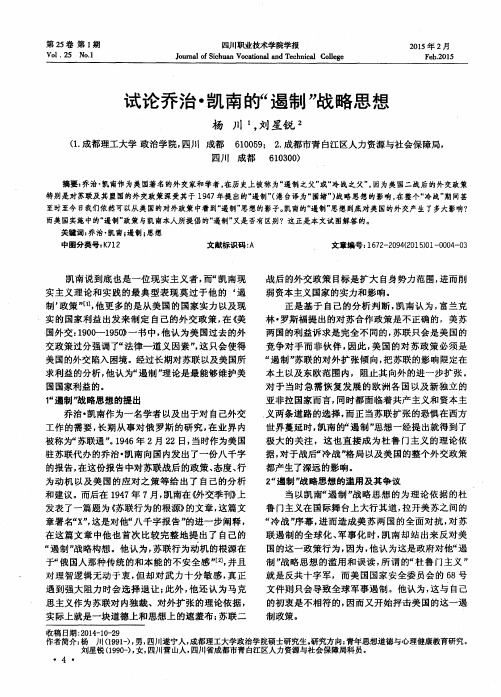
制’ 政策” [ 1 ] , 他更多的是从美国的国家实力以及现 实 的 国家 利 益 出发来 制 定 自 己的外 交 政 策 , 在《 美 国外交: 1 9 O o - _ 1 9 5 o 》 一书 中, 他认为美 国过去 的外 交政策过分强调了“ 法律一道义因素 ” , 这只会使得 美 国 的外 交 陷入 困境 。经过长 期 对苏 联 以及美 国所 求 利益 的分 析 , 他 认 为“ 遏制 ” 理 论 是最 能 够 维护 美
第2 5卷 第 1 期
Vo I . 2 5 N o . 1
四川职业技术学 院学报
J o u r n a l o f S i e h u a n Vo c a t i o n a l a n d T e c h n i c l Co a l l e g e
2 0 1 5年 2月
2 “ 遏制” 战 略思 想 的滥 用及 其 争议
乔治・ 凯南作为一名学者 以及出于对 自己外交 工作的需要 , 长期从事对俄 罗斯 的研 究, 在业界 内
被称 为“ 苏联通 ” 。 1 9 4 6年 2月 2 2日, 当时 作为美 国 驻 苏联 代办 的乔 治 ・ 凯 南 向 国 内发 出 了一份 八 千 字
F e b . 2 0 1 5
试论乔治 ・ 凯南的“ 遏制 ’ ’ 战略思 想
杨 川 , 刘 星锐
( 1 . 成都理工大学 政治学院, 四川 成都 6 1 0 0 5 9 ;2 . 成都市青 白江区人力资源与社会保障局,
四J l I 成 都 6 1 0 3 0 0 )
试论乔治凯南遏制思想的来源——苏联对欧洲的威胁

试论乔治·凯南遏制思想的来源——苏联对欧洲的威胁摘要:乌克兰危机中西方与俄罗斯的交锋,使人们开始重新探讨新冷战的可能性。
考虑到西方遏制战略在冷战中取得的重大胜利,研究该战略的提出者乔治·凯南的思想显得十分重要。
笔者通过文献研究的方法,认为凯南眼中苏联对欧洲的威胁是一种防御性的被动威胁,正是在这样的基本判断下他才在其《苏联行为的根源》论文中提出了相应的遏制理论。
关键词:乔治·凯南苏联欧洲防御型威胁遏制早在20世界30年代中期乔治·凯南在莫斯科任职时,他就提出美苏关系将处于长期的相互误解、相互失望以及相互反诘之中①。
二战后,伴随着国际反法西斯任务的完成,凯南进一步明确西方自由世界与苏联的关系将是竞争对手而不是伙伴②。
在此基本判断上,探讨苏联对欧洲是否有威胁,是一种什么样的威胁,对美国及其盟友制定对苏战略意义重大。
一、苏联对欧洲威胁的具体内容笔者认为,凯南眼中苏联对欧洲的威胁具体来说有以下四个方面:领土范围的扩张,在西方输出红色革命,对战后国际秩序的安排,封闭的单边主义行为模式。
(一)领土范围的扩张凯南通过多年的观察,认定苏联领导人依然保留了过去沙皇扩张主义传统③。
他认为,克里姆林宫中的沙俄式的外交家们的领土与政治影响力扩张的计划,在1939年8月的《苏德互不侵犯条约》中,被展现的淋漓尽致。
包括在芬兰、波罗的海沿岸国家(立陶宛、爱沙尼亚、拉脱维亚)、波兰东部、北布科维纳以及比萨拉比亚地区重建俄国的力量,在波兰西部地区建立保护国,在东普鲁士地区为俄国找到出海口,在中欧以及巴尔干地区所有斯拉夫人聚居区确立统治性的俄国影响力,在奥地利与匈牙利之间打通一条连接西部与南部斯拉夫人聚居区德走①George F. Kennan. Memoirs, 1925-1950[M]. Boston: Little Brown & Company,1967:p.74.②[美]乔治·凯南著,张小明译.苏联行为的根源[J].政治研究,1988(1):79-86.③George F. Kennan. “Russia—Seven Y ears Later”, in George F. Kennan.Memoirs, 1925-1950[M]. Boston: Little Brown & Company,1967:pp.503- 531.廊,以及通过建立相应的据点,控制达达尼尔海峡,使整个黑海成为俄国的势力范围。
当代世界经济与政治知识点汇集

《当代世界经济与政治》知识点汇集1、冷战后,世界政治格局发展的基本的特征是多极化趋势不断发展。
2、当代经济政治国际化的主要承担着和体现着是跨国公司。
3、战后发达资本主义国家经济结构中兴起的新中间阶层主要指企业中层管理人员、工程技术人员和自由职业者。
4、亚太地区有组织的经济合作正式起步时1989年11月在澳大利亚堪培拉举行的亚太经济合作部长会议。
5美国最早提出遏制战略理论,具有“遏制理论之父”之称的代表人物乔治•凯南。
6、建立国际新秩序的基础是和平共处五项原则。
7、冷战时期,美国对社会主义国家实行的主要战略是遏制战略。
8、解决南北问题的根本途径是改革不合理的国际经济秩序。
9、1974年2月毛泽东主席会见赞比亚总统翁达时提出了“三个世界”划分的战略思想。
10、戈尔巴乔夫提出的“国际政治新思维”的核心是“全人类利益高于一切”。
11、到2004年,欧盟扩大成为25个成员国的集团。
12、“一国两制”这一方针最早提出是考虑如何解决台湾问题。
13、中国对外政策的宗旨是维护世界和平,促进共同发展。
14、宣告建立欧洲联盟的条约是“马斯特里赫特条约”。
15、20世纪80年代初明确提出“政治大国”目标的是日本中曾根内阁。
16、谋求世界共同发展的根本途径是建立公正、合理、平等、互利的国际经济新秩序。
17、2003年4月30日,四方正式向巴以双方领导人公布了中东和平“路线图”计划,这四方是美国、欧盟、俄罗斯、联合国。
18、1997年9月,新的美日《防卫合作指针》正式出台,标志着日美安全同盟的加盟。
19、2001年3月,美国政府宣布拒绝《京都议定书》,使国际社会共同治理环境的努力遭到重大挫折。
20、2004年,北约再次吸收7个东欧国家为其成员国。
21、90年代初,美苏两极的冷战结束,但冷战思维依然存在,其表现为:①北大西洋公约组织实行东扩②《美日共同防御条约》进行修改并强化③制造“中国威胁论”的舆论。
22、当前一些区域性和次区域性组织相继成立,这种趋势反映了:①经济集团之间竞争加剧②各国加强经济合作的愿望③各国加强竞争的愿望23、在打击国际恐怖主义问题上,我国的立场是:①符合《联合国》宗旨和原则及遵守公认的国际准则②要有确凿证据和具体目标,避免伤及无辜③发挥安理会的核心作用④要考虑世界和平发展的长远利益。
“遏制政策之父”乔治·凯南与中国
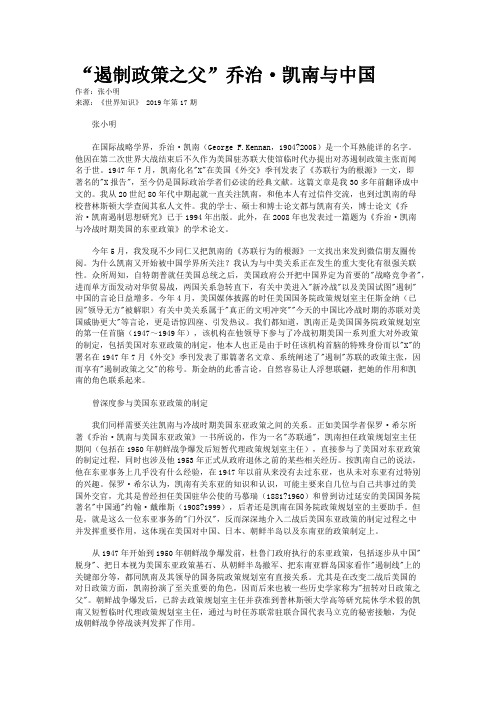
“遏制政策之父”乔治·凯南与中国作者:张小明来源:《世界知识》 2019年第17期张小明在国际战略学界,乔治·凯南(George F.Kennan,1904?2005)是一个耳熟能详的名字。
他因在第二次世界大战结束后不久作为美国驻苏联大使馆临时代办提出对苏遏制政策主张而闻名于世。
1947年7月,凯南化名"X"在美国《外交》季刊发表了《苏联行为的根源》一文,即著名的"X报告",至今仍是国际政治学者们必读的经典文献。
这篇文章是我30多年前翻译成中文的。
我从20世纪80年代中期起就一直关注凯南,和他本人有过信件交流,也到过凯南的母校普林斯顿大学查阅其私人文件。
我的学士、硕士和博士论文都与凯南有关,博士论文《乔治·凯南遏制思想研究》已于1994年出版。
此外,在2008年也发表过一篇题为《乔治·凯南与冷战时期美国的东亚政策》的学术论文。
今年5月,我发现不少同仁又把凯南的《苏联行为的根源》一文找出来发到微信朋友圈传阅。
为什么凯南又开始被中国学界所关注?我认为与中美关系正在发生的重大变化有很强关联性。
众所周知,自特朗普就任美国总统之后,美国政府公开把中国界定为首要的"战略竞争者",进而单方面发动对华贸易战,两国关系急转直下,有关中美进入"新冷战"以及美国试图"遏制"中国的言论日益增多。
今年4月,美国媒体披露的时任美国国务院政策规划室主任斯金纳(已因"领导无方"被解职)有关中美关系属于"真正的文明冲突""今天的中国比冷战时期的苏联对美国威胁更大"等言论,更是语惊四座、引发热议。
我们都知道,凯南正是美国国务院政策规划室的第一任首脑(1947~1949年),该机构在他领导下参与了冷战初期美国一系列重大对外政策的制定,包括美国对东亚政策的制定,他本人也正是由于时任该机构首脑的特殊身份而以"X"的署名在1947年7月《外交》季刊发表了那篇著名文章、系统阐述了"遏制"苏联的政策主张,因而享有"遏制政策之父"的称号。
乔治凯南对俄罗斯的热爱激发了他传奇般的“遏制”策略

乔治凯南对俄罗斯的热爱激发了他传奇般的“遏制”策略乔治F.肯南一生中最具讽刺意味的是,美国旨在阻止苏联扩张主义的冷战“遏制”战略的设计者是多么热爱俄罗斯。
相关内容,包括演员、运动员和领导人保罗·罗伯森(Paul Robeson)肯南可以说在塑造美国对俄罗斯的看法方面发挥了更大的作用一个主要的外国大国,因此我们与这个大国的关系,比现代史上任何一个美国人都重要。
有关的权力是苏联,而有关的时间是二战后的关键时期,这使得他的超大型影响力更加显著。
他将学术和经验的权威融合到外交官、大使、国务院政策顾问的职位上,普林斯顿大学的教授从*** 内外对美国战略施加影响。
对于在冷战中指导国家外交政策的整整一代美国官员来说,凯南成了俄罗斯一切事物的卓越向导。
他的主要遗产是:建议美国人如何最好地抑制苏联的威胁。
然而,尽管他在对抗关系的美国方面发挥了关键作用,但肯南深深地迷恋着俄罗斯。
上世纪二三十年代,在欧洲各地的外交职位上,他掌握了这门语言,据一位同事说:“没有美国人像乔治那样讲俄语。
”。
在他漫长的一生中(肯南于2005年去世,享年101岁),他阅读并重读19世纪俄罗斯文学的伟大作品,并尽可能频繁和广泛地周游俄罗斯。
1958年5月在伦敦时,他去看了安东·契诃夫的《樱桃园》的一场演出,并在日记中记录了一个强烈的反应:看到樱桃园激起了过去和我年轻时所有生锈、不协调的弦:Riga、俄罗斯风景和令人震惊的,它激起了我对契诃夫世界出乎意料的熟悉和信服,换句话说,我的俄罗斯自我,完全是一个契诃夫人的自我,比美国的更加真实,所有这些都在我心中浮出水面,我坐在那里像个孩子一样大哭,拼命不让公司的其他人注意到它。
他的俄罗斯自我和美国自我会造成冷战时期的不安。
尽管肯南深深地钦佩这个国家,但他为列宁和斯大林如此残忍地改变了自己的道路而感到心痛。
肯南对俄罗斯的热情甚至被米哈伊尔·戈尔巴乔夫所了解,他于1987年在华盛顿与肯南会面并告诉他,“我们国家相信,一个人可能是另一个国家的朋友,同时仍然是他自己忠诚和忠诚的公民;这是我们对你的看法。
当代世界经济与政治单选题库(附答案)

世界经济与政治题库一、单项选择题1:提出超越遏制战略的美国总统是()A,里根B,卡特C,尼克松D,老布什2:经济全球化的载体是()A,贸易自由化B,外汇自由化C,世界贸易组织D,跨国公司3:苏联称霸全球的战略正式形成于()A,赫鲁晓夫时期B,勃列日涅夫时期C,安德罗波夫时期D,戈尔巴乔夫时期4:苏联在赫鲁晓夫执政时期制定的外交政策是()A,谋求对美国的军事优势B,苏美合作主宰世界C,独霸全球D,维护世界和平、解放全人类5:提出“和平共处”、“和平过渡”、“和平竞赛”的“三和路线”的是()A,赫鲁晓夫B,斯大林C,勃列日涅夫D,戈尔巴乔夫6:战后提出“三环外交”的英国首相是()A,撒切尔夫人B,丘吉尔C,布莱尔D,梅杰7:中美正式建交是在()A,1971年B,1972年C,1979年 D ,1982年8:中国最终加入世界贸易组织是在()A,1999年B,2000年C,2001年 D ,2002年9:《中苏友好同盟互助条约》签订是在()A,1949年B,1950年C,1951年D,1956年10:2001年主办亚太经合组织非正式首脑会议的城市是()A,莫斯科B,上海C,东京D,墨西哥城11:联合国第一任秘书长是来自挪威的()A,哈马舍尔德B,赖伊C,吴丹D,德奎利亚尔12:中日两国正式建交是在()A,1971年B,1949年C,1972年D,1978年13:克林顿担任美国总统后提出的全球战略是()A,遏制战略B,超越遏制战略C,参与和扩展战略D,和平战略14:西方大国中第一个与中国建立大使级外交关系的是()A,英国B,法国C,加拿大D,日本15:第一个承认新中国并与中国互派大使的国家是()A,苏联B,朝鲜C,越南D,缅甸16:中国首次以五大国之一的地位和身份参加讨论国际问题的重要会议是()A,1953年朝鲜停战协定签字会议B,1955年万隆会议C,1955年的日内瓦会议D,1961年的不结盟首脑会议17:恢复中华人民共和国在联合国的合法席位是在()A,1972年B,1949年C,1978年D,1971年18:联合国安理会现有理事国为()A,16个B,10个C,5个D,15个19:1945年联合国宪章制定会议召开的地点是在()A,纽约B,巴黎C,旧金山D,雅尔塔20:美国最早提出遏制战略、有“遏制理论之父”之称的是()A,基辛格B,乔治·凯南C,布热津斯基D,杜勒斯21:世界贸易组织的前身是()A,国际贸易组织B,国际复兴开发银行C,国际货币基金组织D,关贸总协定22:打开中日关系大门的日本首相是()A,田中角荣B,中曾根康弘C,三木武夫D,佐藤荣作23:第一次明确提出要实现“政治大国”目标的日本首相是()A,中曾根康弘B,田中角荣C,小渊惠三D,细川护熙24:“艾森豪威尔主义”最初提出来是针对()A,拉美地区B,欧洲地区C,中东地区D,亚太地区25:提出“第三世界主义”的法国总统是()A,戴高乐B,密特朗C,蓬皮杜D,希拉克26:两极格局终止、苏联解体是在()A,1989年B,1990年C,1991年D,1992年27:中美正式建交时的美国政府是()A,尼克松政府B,福特政府C,卡特政府D,老布什政府28:北美自由贸易区宣告成立是在()A,1990年B,1992年C,1993年D,1994年29:中国正式加入亚太经合组织是在()A,1989年B,1982年C,1991年D,1992年30:欧盟的前身是()A,欧洲经济体B,欧洲共同市场C,欧共体D,欧洲煤钢共同体31:第一次不结盟国家首脑会议召开的地点是在()A,新德里B,开罗C,万隆D,贝尔格莱德32:田中角荣内阁对日本外交政策作了重大调整,提出了()A,“全方位外交”方针B,“多边自主”方针C,“西方一员”方针D,“等距离”方针33、最终结束越南战争的美国总统是()A,尼克松B,约翰逊C,卡特D,肯尼迪34、国际旧秩序的最主要特征是()A,第三世界国家的贫困B,发达国家占主导地位C,强权政治和霸权主义D,穷国越来越穷,富国越来越富35、尼克松主义实际上是一种()A,和平战略B,遏制战略C,均势战略D,以实力求和平战略36、中美关系中最敏感的问题是()A,人权问题B,台湾问题C,经济问题D,军备控制问题37、2002年2月28日,中俄双方互换《》批准书,条约正式生效。
当代单选
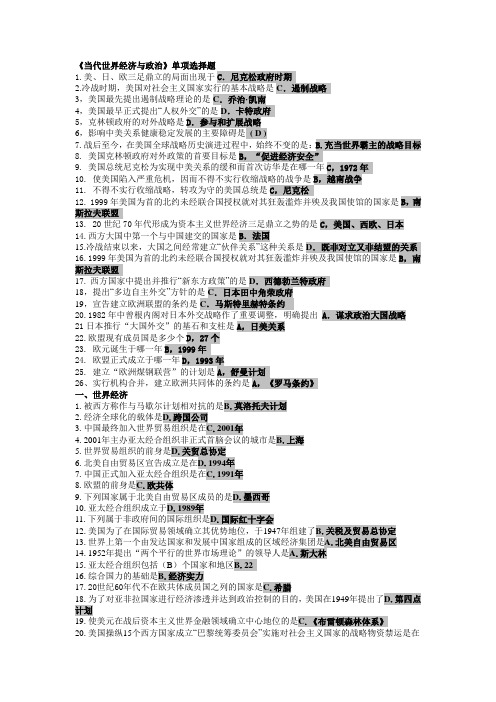
《当代世界经济与政治》单项选择题1.美、日、欧三足鼎立的局面出现于C.尼克松政府时期2.冷战时期,美国对社会主义国家实行的基本战略是C.遏制战略3,美国最先提出遏制战略理论的是C.乔治·凯南4,美国最早正式提出“人权外交”的是D.卡特政府5,克林顿政府的对外战略是D.参与和扩展战略6,影响中美关系健康稳定发展的主要障碍是( D )7.战后至今,在美国全球战略历史演进过程中,始终不变的是:B.充当世界霸主的战略目标8. 美国克林顿政府对外政策的首要目标是B,“促进经济安全”9. 美国总统尼克松为实现中美关系的缓和而首次访华是在哪一年C,1972年10. 使美国陷入严重危机,因而不得不实行收缩战略的战争是B,越南战争11. 不得不实行收缩战略,转攻为守的美国总统是C,尼克松12. 1999年美国为首的北约未经联合国授权就对其狂轰滥炸并殃及我国使馆的国家是B,南斯拉夫联盟13. 20世纪70年代形成为资本主义世界经济三足鼎立之势的是C,美国、西欧、日本14.西方大国中第一个与中国建交的国家是B.法国15.冷战结束以来,大国之间经常建立“伙伴关系”这种关系是D.既非对立又非结盟的关系16.1999年美国为首的北约未经联合国授权就对其狂轰滥炸并殃及我国使馆的国家是B,南斯拉夫联盟17. 西方国家中提出并推行“新东方政策”的是D.西德勃兰特政府18,提出“多边自主外交”方针的是C.日本田中角荣政府19,宣告建立欧洲联盟的条约是C.马斯特里赫特条约20.1982年中曾根内阁对日本外交战略作了重要调整,明确提出 A.谋求政治大国战略21日本推行“大国外交”的基石和支柱是A,日美关系22.欧盟现有成员国是多少个D,27个23. 欧元诞生于哪一年B,1999年24. 欧盟正式成立于哪一年D,1993年25. 建立“欧洲煤钢联营”的计划是A,舒曼计划26、实行机构合并,建立欧洲共同体的条约是A,《罗马条约》一、世界经济1.被西方称作与马歇尔计划相对抗的是B.莫洛托夫计划2.经济全球化的载体是D.跨国公司3.中国最终加入世界贸易组织是在C.2001年4.2001年主办亚太经合组织非正式首脑会议的城市是B.上海5.世界贸易组织的前身是D.关贸总协定6.北美自由贸易区宣告成立是在D.1994年7.中国正式加入亚太经合组织是在C.1991年8.欧盟的前身是C.欧共体9.下列国家属于北美自由贸易区成员的是D.墨西哥10.亚太经合组织成立于D.1989年11.下列属于非政府间的国际组织是D.国际红十字会12.美国为了在国际贸易领域确立其优势地位,于1947年组建了B.关税及贸易总协定13.世界上第一个由发达国家和发展中国家组成的区域经济集团是A.北美自由贸易区14.1952年提出“两个平行的世界市场理论”的领导人是A.斯大林15.亚太经合组织包括(B)个国家和地区B.2216.综合国力的基础是B.经济实力17.20世纪60年代不在欧共体成员国之列的国家是C.希腊18.为了对亚非拉国家进行经济渗透并达到政治控制的目的,美国在1949年提出了D.第四点计划19.使美元在战后资本主义世界金融领域确立中心地位的是C.《布雷顿森林体系》20.美国操纵15个西方国家成立“巴黎统筹委员会”实施对社会主义国家的战略物资禁运是在D.1949年21.资本主义世界三大经济中心的形成是在C.60年代末70年代初22.以美元为支柱的资本主义世界国际货币体系最终崩溃是在D.1973年23.世界贸易组织的宗旨是A.建立没有贸易壁垒的世界市场24.战后初期两极格局在经济上表现为B.封锁与反封锁的斗争25.以最大限度地追求国际高额垄断利润为经营目标的是D.跨国公司26.目前最有成效、一体化程度最高的区域性国际经济组织是A.欧洲联盟27.与“布雷顿森林协定”一同构成布雷顿森林体系的是D.《关税及贸易总协定》28.1981年加入欧共体的国家是C.希腊29.世界经济格局的决定因素是A.各个国家或国家集团社会生产力发展水平所形成的力量对比30.20世纪50-60年代被成为资本主义经济发展的B.黄金时期31.第四点计划的主要内容是C.利用技术和资本输出对不发达国家进行经济和政治渗透32.1947年6月,美国提出了“复兴欧洲计划”,后来被人们称为A.马歇尔计划33.当前世界经济面临的发展问题的核心是A .发展中国家的发展问题34.确立了美元在战后国际金融领域中心地位的是B .布雷顿森林体系35.被西方称作与马歇尔计划相对抗的是B .莫洛托夫计划二、世界政治1.联合国第一任秘书长是来自挪威的B.赖伊2.联合国安理会现有理事国C.5个3.1945年联合国宪章制定会议召开的地点是在C.旧金山4.两极格局终止、苏联解体是在C.1991年5.标志冷战正式开始是C.杜鲁门主义的提出6.“新东方政策”首创者是A.勃兰特7.联合国正式成立于B.1945年10月8.联合国总部位于C.纽约9.战后很快形成、并奠定两极格局基础的是D.雅尔塔体系10.社会主义国家组建的华沙条约组织成立于C.1955年11.为组建联合国而召开的多次会议中的最后一次是C.雅尔塔会议12.古巴导弹危机发生于C.1962年13.社会主义阵营与资本主义阵营在军事上的第一次直接交锋是在C.朝鲜战争14.APEC上海会议在APEC的历史上发表的第一个独立的政治性声明是C.《反对恐怖主义声明》15.冷战真正开始于C.1947年16.国际法院的总部设在D.荷兰海牙17.联合国的主要审议机构是B.联合国大会18.联合国的执行机构是B.秘书处19.北大西洋公约组织正式成立于A.1949年20.联合国秘书长的任期为A.5年21.20世纪50年代至70年代初,导致西方阵营分化的主要原因是B.西方阵营中力量对比发生变化22.“联合国日”定于每年的C.10月24日23.“联合国宪章日”定于每年的B.6月26日24.参加波茨坦会议的美国总统是B.杜鲁门25.(B)是指在国际舞台上充当主角的国家和国际组织在一定历史时期内相互联系、相互作用而形成的一种相对稳定的结构和态势。
世界史近代史名词解释
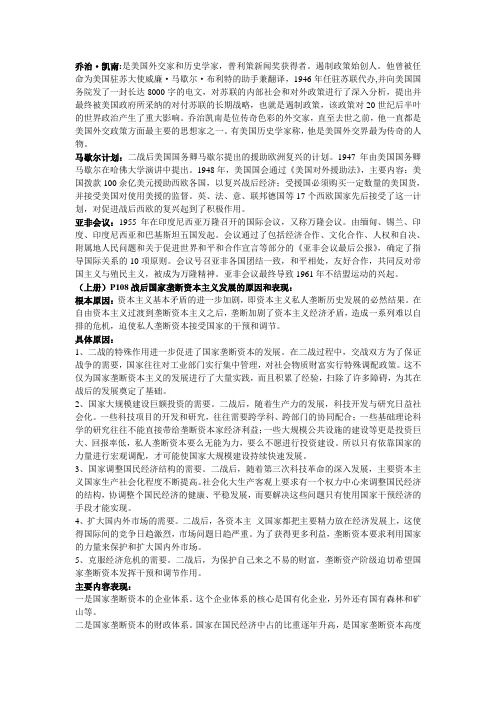
乔治·凯南:是美国外交家和历史学家,普利策新闻奖获得者。
遏制政策始创人。
他曾被任命为美国驻苏大使威廉·马歇尔·布利特的助手兼翻译,1946年任驻苏联代办,并向美国国务院发了一封长达8000字的电文,对苏联的内部社会和对外政策进行了深入分析,提出并最终被美国政府所采纳的对付苏联的长期战略,也就是遏制政策,该政策对20世纪后半叶的世界政治产生了重大影响。
乔治凯南是位传奇色彩的外交家,直至去世之前,他一直都是美国外交政策方面最主要的思想家之一。
有美国历史学家称,他是美国外交界最为传奇的人物。
马歇尔计划:二战后美国国务卿马歇尔提出的援助欧洲复兴的计划。
1947年由美国国务卿马歇尔在哈佛大学演讲中提出。
1948年,美国国会通过《美国对外援助法》,主要内容:美国拨款100余亿美元援助西欧各国,以复兴战后经济;受援国必须购买一定数量的美国货,并接受美国对使用美援的监督。
英、法、意、联邦德国等17个西欧国家先后接受了这一计划,对促进战后西欧的复兴起到了积极作用。
亚非会议:1955年在印度尼西亚万隆召开的国际会议,又称万隆会议。
由缅甸、锡兰、印度、印度尼西亚和巴基斯坦五国发起。
会议通过了包括经济合作、文化合作、人权和自决、附属地人民问题和关于促进世界和平和合作宣言等部分的《亚非会议最后公报》,确定了指导国际关系的10项原则。
会议号召亚非各国团结一致,和平相处,友好合作,共同反对帝国主义与殖民主义,被成为万隆精神。
亚非会议最终导致1961年不结盟运动的兴起。
(上册)P108战后国家垄断资本主义发展的原因和表现:根本原因:资本主义基本矛盾的进一步加剧,即资本主义私人垄断历史发展的必然结果。
在自由资本主义过渡到垄断资本主义之后,垄断加剧了资本主义经济矛盾,造成一系列难以自排的危机,迫使私人垄断资本接受国家的干预和调节。
具体原因:1、二战的特殊作用进一步促进了国家垄断资本的发展。
在二战过程中,交战双方为了保证战争的需要,国家往往对工业部门实行集中管理,对社会物质财富实行特殊调配政策。
凯南与“遏制”政策
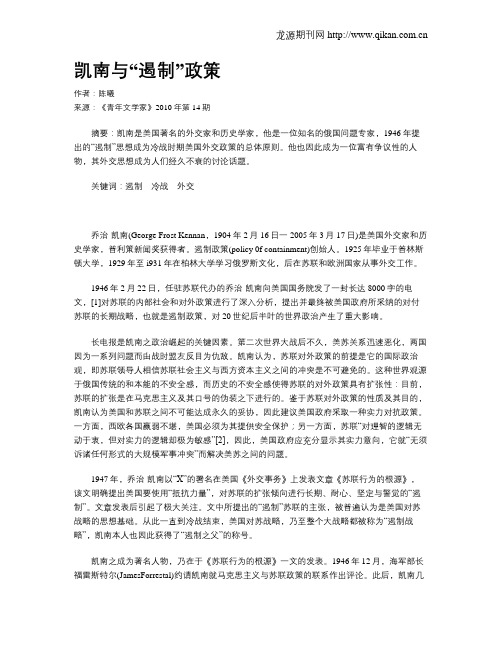
凯南与“遏制”政策作者:陈曦来源:《青年文学家》2010年第14期摘要:凯南是美国著名的外交家和历史学家,他是一位知名的俄国问题专家,1946年提出的“遏制”思想成为冷战时期美国外交政策的总体原则。
他也因此成为一位富有争议性的人物,其外交思想成为人们经久不衰的讨论话题。
关键词:遏制冷战外交乔治·凯南(George Frost Kennan,1904年2月16日一2005年3月17日)是美国外交家和历史学家,普利策新闻奖获得者。
遏制政策(policy 0f containment)创始人。
1925年毕业于普林斯顿大学,1929年至i931年在柏林大学学习俄罗斯文化,后在苏联和欧洲国家从事外交工作。
1946年2月22日,任驻苏联代办的乔治·凯南向美国国务院发了一封长达8000字的电文,[1]对苏联的内部社会和对外政策进行了深入分析,提出并最终被美国政府所采纳的对付苏联的长期战略,也就是遏制政策,对20世纪后半叶的世界政治产生了重大影响。
长电报是凯南之政治崛起的关键因素。
第二次世界大战后不久,美苏关系迅速恶化,两国因为一系列问题而由战时盟友反目为仇敌。
凯南认为,苏联对外政策的前提是它的国际政治观,即苏联领导人相信苏联社会主义与西方资本主义之间的冲突是不可避免的。
这种世界观源于俄国传统的和本能的不安全感,而历史的不安全感使得苏联的对外政策具有扩张性:目前,苏联的扩张是在马克思主义及其口号的伪装之下进行的。
鉴于苏联对外政策的性质及其目的,凯南认为美国和苏联之间不可能达成永久的妥协,因此建议美国政府采取一种实力对抗政策。
一方面,西欧各国赢弱不堪,美国必须为其提供安全保护;另一方面,苏联“对理智的逻辑无动于衷,但对实力的逻辑却极为敏感”[2],因此,美国政府应充分显示其实力意向,它就“无须诉诸任何形式的大规模军事冲突”而解决美苏之间的问题。
1947年,乔治·凯南以“X”的署名在美国《外交事务》上发表文章《苏联行为的根源》,该文明确提出美国要使用“抵抗力量”,对苏联的扩张倾向进行长期、耐心、坚定与警觉的“遏制”。
乔治.凯南的遏制战略
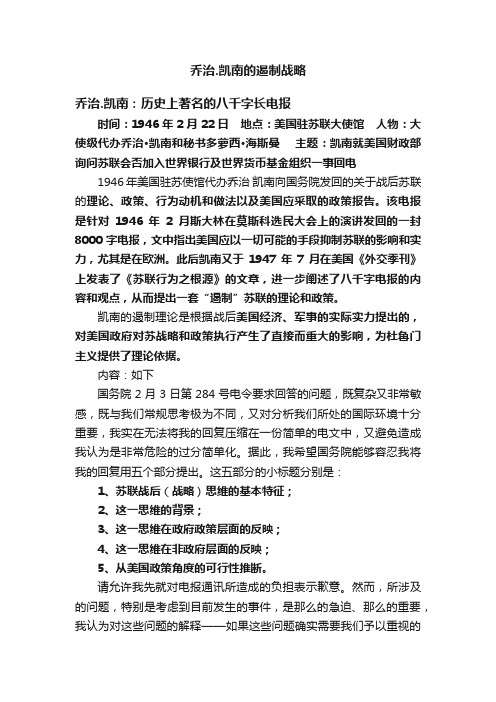
乔治.凯南的遏制战略乔治.凯南:历史上著名的八千字长电报时间:1946年2月22日地点:美国驻苏联大使馆人物:大使级代办乔治·凯南和秘书多萝西·海斯曼主题:凯南就美国财政部询问苏联会否加入世界银行及世界货币基金组织一事回电1946年美国驻苏使馆代办乔治凯南向国务院发回的关于战后苏联的理论、政策、行为动机和做法以及美国应采取的政策报告。
该电报是针对1946年2月斯大林在莫斯科选民大会上的演讲发回的一封8000字电报,文中指出美国应以一切可能的手段抑制苏联的影响和实力,尤其是在欧洲。
此后凯南又于1947年7月在美国《外交季刊》上发表了《苏联行为之根源》的文章,进一步阐述了八千字电报的内容和观点,从而提出一套“遏制”苏联的理论和政策。
凯南的遏制理论是根据战后美国经济、军事的实际实力提出的,对美国政府对苏战略和政策执行产生了直接而重大的影响,为杜鲁门主义提供了理论依据。
内容:如下国务院2月3日第284号电令要求回答的问题,既复杂又非常敏感,既与我们常规思考极为不同,又对分析我们所处的国际环境十分重要,我实在无法将我的回复压缩在一份简单的电文中,又避免造成我认为是非常危险的过分简单化。
据此,我希望国务院能够容忍我将我的回复用五个部分提出。
这五部分的小标题分别是:1、苏联战后(战略)思维的基本特征;2、这一思维的背景;3、这一思维在政府政策层面的反映;4、这一思维在非政府层面的反映;5、从美国政策角度的可行性推断。
请允许我先就对电报通讯所造成的负担表示歉意。
然而,所涉及的问题,特别是考虑到目前发生的事件,是那么的急迫、那么的重要,我认为对这些问题的解释——如果这些问题确实需要我们予以重视的话——(采用如此长电的形式)是值得的。
下面是我的解释。
第一部分思维的习惯和背景;认识和判断;利益出发点,思考的方式和角度;目标和意图苏联政府宣传机器所宣扬的战后(战略)思维的基本特征如下:一、苏联仍处于“敌对的资本主义(世界)的包围”之中,长期看来,取得并保持永久的和平共处是不可能的。
《当代世界经济与政治》网上考试题库(1)
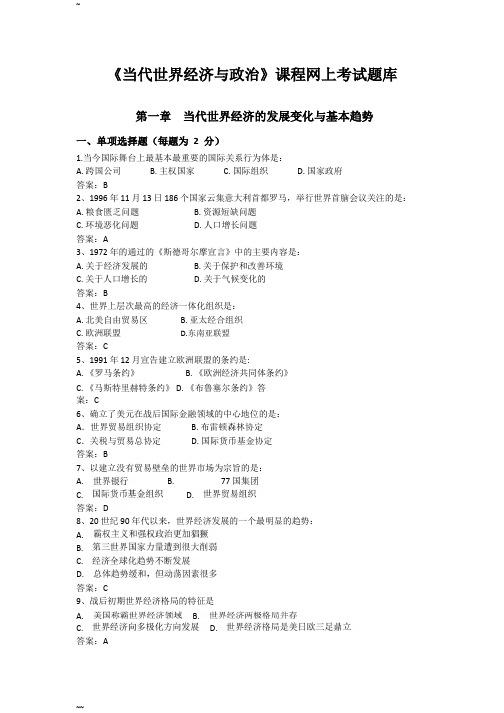
《当代世界经济与政治》课程网上考试题库第一章当代世界经济的发展变化与基本趋势一、单项选择题(每题为2分)1.当今国际舞台上最基本最重要的国际关系行为体是:A. 跨国公司B. 主权国家C. 国际组织D. 国家政府答案:B2、1996 年 11 月 13 日 186 个国家云集意大利首都罗马,举行世界首脑会议关注的是:A. 粮食匮乏问题B. 资源短缺问题C. 环境恶化问题D. 人口增长问题答案:A3、1972 年的通过的《斯德哥尔摩宣言》中的主要内容是:A. 关于经济发展的B. 关于保护和改善环境C. 关于人口增长的D. 关于气候变化的答案:B4、世界上层次最高的经济一体化组织是:A. 北美自由贸易区B. 亚太经合组织C. 欧洲联盟D.东南亚联盟答案:C5、1991 年 12 月宣告建立欧洲联盟的条约是:A. 《罗马条约》B. 《欧洲经济共同体条约》C. 《马斯特里赫特条约》D. 《布鲁塞尔条约》答案:C6、确立了美元在战后国际金融领域的中心地位的是:A.世界贸易组织协定 B. 布雷顿森林协定C.关税与贸易总协定 D. 国际货币基金协定答案:B7、以建立没有贸易壁垒的世界市场为宗旨的是:A. B.77 国集团C. D.答案:D8、20 世纪 90 年代以来,世界经济发展的一个最明显的趋势:A.B.C.D.答案:C9、战后初期世界经济格局的特征是A. B.C. D.答案:A10、20 世纪 90 年代以来世界经济出现出现的最新动向是:A. 日本经济快速发展B. 区域经济集团化加速发展C. 欧洲联盟经济快速发展D. 俄罗斯经济经济停止答案:B二、多项选择题(每题为3分)1、亚太经济合作组织逐步形成了自己独特的合作方式,即“APEC”,这一合作方式A. 承认多样性B. 强调协商一致C. 强调自主自愿D. 强调灵活渐进E 它是一个经济论坛性质的组织答案:ABCDE2、二战后建立的“布雷顿森林体系”包括下列内容A.《联合国货币金融会议最后协定书》B.《国际货币基金组织协定》C.《国际复兴开发银行协定》D.《关税与贸易总协定》E.《欧洲复兴方案》答案:ABCD3、当今世界经济发展的趋势和特点是A.世界经济发展不平衡加剧B.世界经济全球化和区域化并行发展C.以科技为先导、以经济为中心的综合国力竞争不断加剧D.市场经济体制在全球范围内运行E.新科技革命产生深远影响,知识经济迅速兴起答案:ABCDE4、20 世纪 60 年代末 70 年代初世界经济格局变化是A.美国在世界经济中优势地位的下降B.西欧、日本成为资本主义世界的两大经济中心C.苏联经济实力继续增强D.发展中国家的经济地位明显上升E.美国一家独霸世界经济答案:ABCD5、世界银行、国际货币基金组织的共同之处在于A.都是在1944年7月布雷顿森林召开的“联合国国际货币金融会议”上决定建立的B.都是国际金融机构C.在表决制度上,都实行一国一票制D.都是联合国的机构,每年都须向联合国经济及社会理事会报告工作E.总部都设在美国纽约答案:ABD三、判断题(每题 1.5分)1、世界经济全球化和区域经济集团化是当今世界两种截然对立的经济发展趋势。
遏制理论之父:乔治

遏制理论之父:乔治·凯南乔治·凯南(George Frost Kennan,1904年2月16日- 2005年3月17日)是美国外交家和历史学家,普利策新闻奖获得者。
遏制政策(policy of containment)始创人。
1、人物生平遏制政策的鼻祖乔治·凯南1904年出生在美国威斯康辛州的一个偏远山区,父亲科休斯·凯南是一个律师兼工程师,他的母亲很早就去世了,家庭并不富裕。
1925年毕业于普林斯顿大学,就去了外交部工作,预计美苏关系会越来越重要,就选择了俄语和俄国事务方面的专门培训。
1929年至1931年在柏林大学学习俄罗斯文化,并先后在日内瓦、汉堡、柏林和波罗的海沿岸国家从事外交工作。
这期间,他和一个挪威妇女成婚并生了2个女儿。
此后,他被任命为美国驻苏大使威廉·马歇尔·布利特的助手兼翻译,在苏联首次任职时,他对苏联领导人逐渐形成不信任感,对那些在大萧条时期认为社会主义可以建立更为公正的社会秩序的美国人中的理想主义者嗤之以鼻,然而,他并不担心苏联对西方的军事威胁,他赞成苏联和西方达成有限的妥协。
凯南在莫斯科当了几年领事和秘书后,到国务院苏联办公室工作了一年,然后被派往布拉格和柏林,凯南在柏林时正好碰上美国对德宣战,他被关了几个月后被遣送回美国。
战争期间,他在里斯本和伦敦工作,1944-1946年,他任驻莫斯科代办,战争结束时,他在那里观察苏联政权的举动和后来被称为“冷战”的开始。
1946年2月22日,任驻苏联代办的乔治·凯南向美国国务院发了一封长达8000字的电文,对苏联的内部社会和对外政策进行了深入分析,提出并最终被美国政府所采纳的对付苏联的长期战略,也就是遏制政策,对20世纪后半叶的世界政治产生了重大影响。
1947年,乔治·凯南以“X”的署名在美国《外交事务》上发表文章《苏联行为的根源》,该文明确提出美国要使用“抵抗力量”,对苏联的扩张倾向进行长期、耐心、坚定与警觉的“遏制”。
大学政治经济学考试练习题及答案1811
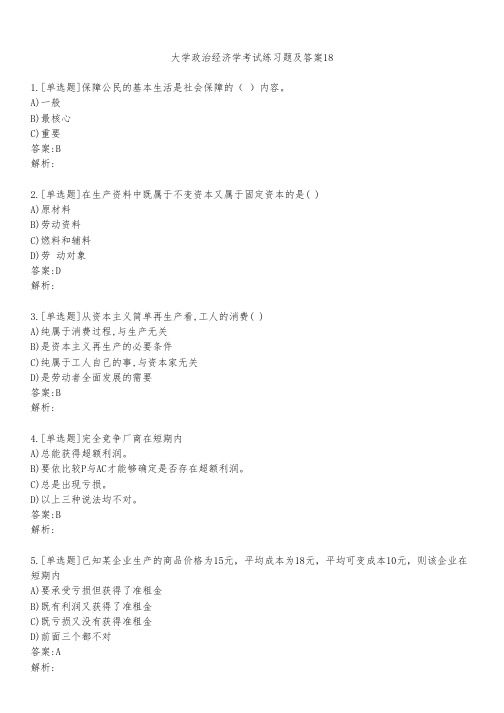
大学政治经济学考试练习题及答案181.[单选题]保障公民的基本生活是社会保障的( )内容。
A)一般B)最核心C)重要答案:B解析:2.[单选题]在生产资料中既属于不变资本又属于固定资本的是( )A)原材料B)劳动资料C)燃料和辅料D)劳 动对象答案:D解析:3.[单选题]从资本主义简单再生产看,工人的消费( )A)纯属于消费过程,与生产无关B)是资本主义再生产的必要条件C)纯属于工人自己的事,与资本家无关D)是劳动者全面发展的需要答案:B解析:4.[单选题]完全竞争厂商在短期内A)总能获得超额利润。
B)要依比较P与AC才能够确定是否存在超额利润。
C)总是出现亏损。
D)以上三种说法均不对。
答案:B解析:5.[单选题]已知某企业生产的商品价格为15元,平均成本为18元,平均可变成本10元,则该企业在短期内A)要承受亏损但获得了准租金B)既有利润又获得了准租金C)既亏损又没有获得准租金D)前面三个都不对6.[单选题]日本经济高速增长时期是在:A)1949 年-1956 年B)1956 年-1973 年C)1993 年-2000 年D)2000 年-2010 年答案:B解析:7.[单选题]社会生产方式是( )A)经济基础和上层建筑的有机结合和统一B)劳动者和劳动资料的有机结合和统一C)生产力和生产关系的有机结合和统一D)生产资料所有权和使用权的有机结合和统一答案:C解析:8.[单选题]在各种垄断组织形式中出现较晚,但与其他形式相比更为复杂的种高级垄断组织形式是A)辛迪加B)卡特尔C)混合联合公司D)康采恩答案:D解析:9.[单选题]某厂商每年从企业的总收入中取出一部分作为自己所提供的生产要素的报酬,这部分资金被视为 ( )。
A)显性成本B)隐性成本C)经济利润D)沉没成本答案:B解析:10.[单选题]如果厂商处于完全竞争的产品市场中,且要素A是其唯一的可变要素,则该厂商对要素A的需求曲线由以下何者给出?( )A)VMP曲线B)MPP曲线C)MFC曲线D)都不是11.[单选题]生产中的能动因素是A)人的劳动B)劳动资料C)生产工具D)劳动对象答案:A解析:12.[单选题]在我国的外交工作布局中,( )是舞台。
乔治·凯南与冷战的起源

乔治·凯南与冷战的起源乔治·凯南是美国冷战遏制政策的提出者,他的苏联观受到叔父的影响,20世纪三四十年代的驻苏经历使其成为“苏联通”。
1946年他在一封八千字长电报中提出对苏战略,即美国要运用政治、经济、外交等多种途径抑制苏联的发展和对外扩张。
次年他在《苏联行为的根源》中完善了自己的遏制思想。
在欧洲,他主张以德国为中心建立欧洲联邦抵御苏联的渗透;在亚洲,他忽视新中国的地位和作用,希望通过民主改造重塑日本。
他的这些思想对日后美国的冷战政策产生了深远持久的影响。
尽管凯南誉满天下,但不善妥协的性格给他的职业生涯造成困境,对中国的误判也证明他的局限性。
标签:乔治·凯南;冷战;遏制思想;外交影响乔治·凯南是美国著名的国际关系学家,外交家,外交评论学者,历史学家,尤其在苏联问题方面研究成果显著。
凯南在学界被誉为“遏制之父”,他倾其一生为美国的冷战政策尤其是冷战时期的对苏政策作出了突出的贡献。
凱南生于1904年,在威斯康星州的一个爱尔兰裔移民家庭。
他日后成为“苏联通”很大程度上到受了他叔父老凯南的影响。
老凯南是一位美国记者,职业生涯中曾多次到访俄国,其中1885—1886年间他实地考察了俄国的西伯利亚流放地,这段经历深深影响了老凯南对苏联印象。
他还就调查结果出版了一本书,真实地记录了当时西伯利亚流放地政治犯们忍受的非人的痛苦。
可以说老凯南是美国研究苏联问题的先驱。
凯南也追随他叔父的脚步,选择了研究苏联问题的道路,他在晚年的回忆录中说道“脑中有老凯南创立的家庭传统。
”这也成了凯南一生的转折点。
1925年他从普林斯顿大学毕业,1926年进入外交机构,被派往欧洲。
1929—1931年进入柏林大学东方学院,专门学习俄国的语言,文化,历史地理法律以及经济,这些学习也为他日后研究苏联问题打下了坚实的基础。
1931—1933任职于拉脱维亚里加美国大使馆。
在里加的那段时间里凯南在处理公务之余,还会通过当地的报刊体验旧俄文化生活等方法了解苏联,这也成为凯南研究苏联问题的起点。
containment of George F. Kennan

乔治•凯南(George F. Kennan)遏制政策(containment)始创人。
他的八千字电报及其在《外交》季刊上以X署名发表的《苏联行为的根源》使其获得了“冷战之父”的称号。
下面是其“X论文”的英文全文。
The political personality of Soviet power as we know it today is the product of ideology and circumstances: ideology inherited by the present Soviet leaders from the movement in which they had their political origin, and circumstances of the power which they now have exercised for nearly three decades in Russia. There can be few tasks of psychological analysis more difficult than to try to trace the interaction of these two forces and the relative role of each in the determination of official Soviet conduct. Yet the attempt must be made if that conduct is to be understood and effectively countered.It is difficult to summarize the set of ideological concepts with which the Soviet leaders came into power. Marxian ideology, in its Russian-Communist projection, has always been in process of subtle evolution. The materials on which it bases itself are extensive and complex. But the outstanding features of Communist thought as it existed in 1916 may perhaps be summarized as follows: (a) that the central factor in the life of man, the factor which determines the character of public life and the "physiognomy of society," is the system by which material goods are produced and exchanged; (b) that the capitalist system of production is a nefarious one which inevitably leads to the exploitation of the working class by the capital-owning class and is incapable of developing adequately the economic resources of society or of distributing fairly the material goods produced by human labor; (c) that capitalism contains the seeds of its own destruction and must, in view of the inability of the capital-owning class to adjust itself to economic change, result eventually and inescapably in a revolutionary transfer of power to the working class; and (d) that imperialism, the final phase of capitalism, leads directly to war and revolution.(《国际关系经典选读》这本书里省略了以下黄色的两段)The rest may be outlined in Lenin's own words: "Unevenness of economic and political development is the inflexible law of capitalism. It follows from this that the victory of Socialism may come originally in a few capitalist countries or even in a single capitalist country. The victorious proletariat of that country, having expropriated the capitalists and having organized Socialist production at home, would rise against the remaining capitalist world, drawing to itself in the process the oppressed classes of other countries." [see endnote 1] It must be noted that there was no assumption that capitalism would perish without proletarian revolution. A final push was needed from a revolutionary proletariat movement in order to tip over the tottering structure. But it was regarded as inevitable that sooner or later that push be given.For 50 years prior to the outbreak of the Revolution, this pattern of thought had exercised great fascination for the members of the Russian revolutionary movement. Frustrated, discontented, hopeless of finding self-expression -- or too impatient to seek it -- in the confining limits of the Tsarist political system, yet lacking wide popular support for their choice of bloody revolution as a means of social betterment, these revolutionists found in Marxist theory a highly convenient rationalization for their own instinctive desires. It afforded pseudo-scientific justification for their impatience, for their categorical denial of all value in the Tsarist system, for their yearning for power and revenge and for their inclination to cut corners in the pursuit of it. It is therefore no wonder that they had come to believe implicitly in the truth and soundness of theMarxian-Leninist teachings, so congenial to their own impulses and emotions. Their sincerity need not be impugned. This is a phenomenon as old as human nature itself. It has never been more aptly described than by Edward Gibbon, who wrote in The Decline and Fall of the Roman Empire: "From enthusiasm to imposture the step is perilous and slippery; the demon of Socrates affords a memorable instance how a wise man may deceive himself, how a good man may deceive others, how the conscience may slumber in a mixed and middle state between self-illusion and voluntary fraud." And it was with this set of conceptions that the members of the Bolshevik Party entered into power.Now it must be noted that through all the years of preparation for revolution, the attention of these men, as indeed of Marx himself, had been centered less on the future form which Socialism [see endnote 2] would take than on the necessary overthrow of rival power which, in their view, had to precede the introduction of Socialism. Their views, therefore, on the positive program to be put into effect, once power was attained, were for the most part nebulous, visionary and impractical. Beyond the nationalization of industry and the expropriation of large private capital holdings there was no agreed program. The treatment of the peasantry, which according to the Marxist formulation was not of the proletariat, had always been a vague spot in the pattern of Communist thought; and it remained an object of controversy and vacillation for the first ten years of Communist power.The circumstances of the immediate post-revolution period -- the existence in Russia of civil war and foreign intervention, together with the obvious fact that the Communists represented only a tiny minority of the Russian people -- made the establishment of dictatorial power a necessity. The experiment with "war Communism" and the abrupt attempt to eliminate private production and trade had unfortunate economic consequences and caused further bitterness against the new revolutionary regime. While the temporary relaxation of the effort to communize Russia, represented by the New Economic Policy, alleviated some of this economic distress and thereby served its purpose, it also made it evident that the "capitalistic sector of society" was still prepared to profit at once from any relaxation of governmental pressure, and would, if permitted to continue to exist, always constitute a powerful opposing element to the Soviet regime and a serious rival for influence in the country. Somewhat the same situation prevailed with respect to the individual peasant who, in his own small way, was also a private producer.Lenin, had he lived, might have proved a great enough man to reconcile these conflicting forces to the ultimate benefit of Russian society, though this is questionable. But be that as it may, Stalin, and those whom he led in the struggle for succession to Lenin's position of leadership, were not the men to tolerate rival political forces in the sphere of power which they coveted. Their sense of insecurity was too great. Their particular brand of fanaticism, unmodified by any of the Anglo-Saxon traditions of compromise, was too fierce and too jealous to envisage any permanent sharing of power. From the Russian-Asiatic world out of which they had emerged they carried with them a skepticism as to the possibilities of permanent and peaceful coexistence of rival forces. Easily persuaded of their own doctrinaire "rightness," they insisted on the submission or destruction of all competing power. Outside of the Communist Party, Russian society was to have no rigidity. There were to be no forms of collective human activity or association which would notbe dominated by the Party. No other force in Russian society was to be permitted to achieve vitality or integrity. Only the Party was to have structure. All else was to be an amorphous mass.And within the Party the same principle was to apply. The mass of Party members might go through the motions of election, deliberation, decision and action; but in these motions they were to be animated not by their own individual wills but by the awesome breath of the Party leadership and the over-brooding presence of "the word."Let it be stressed again that subjectively these men probably did not seek absolutism for its own sake. They doubtless believed -- and found it easy to believe -- that they alone knew what was good for society and that they would accomplish that good once their power was secure and unchallengeable. But in seeking that security of their own rule they were prepared to recognize no restrictions, either of God or man, on the character of their methods. And until such time as that security might be achieved, they placed far down on their scale of operational priorities the comforts and happiness of the peoples entrusted to their care.Now the outstanding circumstance concerning the Soviet regime is that down to the present day this process of political consolidation has never been completed and the men in the Kremlin have continued to be predominantly absorbed with the struggle to secure and make absolute the power which they seized in November 1917. They have endeavored to secure it primarily against forces at home, within Soviet society itself. But they have also endeavored to secure it against the outside world. For ideology, as we have seen, taught them that the outside world was hostile and that it was their duty eventually to overthrow the political forces beyond their borders. The powerful hands of Russian history and tradition reached up to sustain them in this feeling. Finally, their own aggressive intransigence with respect to the outside world began to find its own reaction; and they were soon forced, to use another Gibbonesque phrase, "to chastise the contumacy" which they themselves had provoked. It is an undeniable privilege of every man to prove himself right in the thesis that the world is his enemy; for if he reiterates it frequently enough and makes it the background of his conduct he is bound eventually to be right.Now it lies in the nature of the mental world of the Soviet leaders, as well as in the character of their ideology, that no opposition to them can be officially recognized as having any merit or justification whatsoever. Such opposition can flow, in theory, only from the hostile and incorrigible forces of dying capitalism. As long as remnants of capitalism were officially recognized as existing in Russia, it was possible to place on them, as an internal element, part of the blame for the maintenance of a dictatorial form of society. But as these remnants were liquidated, little by little, this justification fell away; and when it was indicated officially that they had been finally destroyed, it disappeared altogether. And this fact created one of the most basic of the compulsions which came to act upon the Soviet regime: since capitalism no longer existed in Russia and since it could not be admitted that there could be serious or widespread opposition to the Kremlin springing spontaneously from the liberated masses under its authority, it became necessary to justify the retention of the dictatorship by stressing the menace of capitalism abroad. 《国际关系经典选读》这本书里省略了以下黄色的两段)This began at an early date. In 1924 Stalin specifically defended the retention of the "organs of suppression," meaning, among others, the army and the secret police, on the ground that "as long as there is a capitalist encirclement there will be danger of intervention with all the consequences that flow from that danger." In accordance with that theory, and from that time on, all internal opposition forces in Russia have consistently been portrayed as the agents of foreign forces of reaction antagonistic to Soviet power.By the same token, tremendous emphasis has been placed on the original Communist thesis of a basic antagonism between the capitalist and Socialist worlds. It is clear, from many indications, that this emphasis is not founded in reality. The real facts concerning it have been confused by the existence abroad of genuine resentment provoked by Soviet philosophy and tactics and occasionally by the existence of great centers of military power, notably the Nazi regime in Germany and the Japanese Government of the late 1930s, which did indeed have aggressive designs against the Soviet Union. But there is ample evidence that the stress laid in Moscow on the menace confronting Soviet society from the world outside its borders is founded not in the realities of foreign antagonism but in the necessity of explaining away the maintenance of dictatorial authority at home.Now the maintenance of this pattern of Soviet power, namely, the pursuit of unlimited authority domestically, accompanied by the cultivation of the semi-myth of implacable foreign hostility, has gone far to shape the actual machinery of Soviet power as we know it today. Internal organs of administration which did not serve this purpose withered on the vine. Organs which did serve this purpose became vastly swollen. The security of Soviet power came to rest on the iron discipline of the Party, on the severity and ubiquity of the secret police, and on the uncompromising economic monopolism of the state. The "organs of suppression," in which the Soviet leaders had sought security from rival forces, became in large measure the masters of those whom they were designed to serve. Today the major part of the structure of Soviet power is committed to the perfection of the dictatorship and to the maintenance of the concept of Russia as in a state of siege, with the enemy lowering beyond the walls. And the millions of human beings who form that part of the structure of power must defend at all costs this concept of Russia's position, for without it they are themselves superfluous.As things stand today, the rulers can no longer dream of parting with these organs of suppression. The quest for absolute power, pursued now for nearly three decades with a ruthlessness unparalleled (in scope at least) in modern times, has again produced internally, as it did externally, its own reaction. The excesses of the police apparatus have fanned the potential opposition to the regime into something far greater and more dangerous than it could have been before those excesses began.But least of all can the rulers dispense with the fiction by which the maintenance of dictatorial power has been defended. For this fiction has been canonized in Soviet philosophy by the excesses already committed in its name; and it is now anchored in the Soviet structure of thought by bonds far greater than those of mere ideology.So much for the historical background. What does it spell in terms of the political personality of Soviet power as we know it today?Of the original ideology, nothing has been officially junked. Belief is maintained in the basic badness of capitalism, in the inevitability of its destruction, in the obligation of the proletariat to assist in that destruction and to take power into its own hands. But stress has come to be laid primarily on those concepts which relate most specifically to the Soviet regime itself: to its position as the sole truly Socialist regime in a dark and misguided world, and to the relationships of power within it.The first of these concepts is that of the innate antagonism between capitalism and Socialism. We have seen how deeply that concept has become imbedded in foundations of Soviet power. It has profound implications for Russia's conduct as a member of international society. It means that there can never be on Moscow's side any sincere assumption of a community of aims between the Soviet Union and powers which are regarded as capitalist. It must invariably be assumed in Moscow that the aims of the capitalist world are antagonistic to the Soviet regime, and therefore to the interests of the peoples it controls. If the Soviet government occasionally sets its signature to documents which would indicate the contrary, this is to be regarded as a tactical maneuver permissible in dealing with the enemy (who is without honor) and should be taken in the spirit of caveat emptor. Basically, the antagonism remains. It is postulated. And from it flow many of the phenomena which we find disturbing in the Kremlin's conduct of foreign policy: the secretiveness, the lack of frankness, the duplicity, the wary suspiciousness and the basic unfriendliness of purpose. These phenomena are there to stay, for the foreseeable future. There can be variations of degree and of emphasis. When there is something the Russians want from us, one or the other of these features of their policy may be thrust temporarily into the background; and when that happens there will always be Americans who will leap forward with gleeful announcements that "the Russians have changed," and some who will even try to take credit for having brought about such "changes." But we should not be misled by tactical maneuvers. These characteristics of Soviet policy, like the postulate from which they flow, are basic to the internal nature of Soviet power, and will be with us, whether in the foreground or the background, until the internal nature of Soviet power is changed.This means that we are going to continue for a long time to find the Russians difficult to deal with. It does not mean that they should be considered as embarked upon a do-or-die program to overthrow our society by a given date. The theory of the inevitability of the eventual fall of capitalism has the fortunate connotation that there is no hurry about it.(《国际关系经典选读》这本书里省略了以下黄色的部分)Meanwhile, what is vital is that the "Socialist fatherland" -- that oasis of power which has been already won for Socialism in the person of the Soviet Union -- should be cherished and defended by all good Communists at home and abroad, its fortunes promoted, its enemies badgered and confounded. The promotion of premature, "adventuristic" revolutionary projects abroad which might embarrass Soviet power in any way would be an inexcusable, even a counterrevolutionary act. The cause of Socialism is thesupport and promotion of Soviet power, as defined in Moscow.This brings us to the second of the concepts important to contemporary Soviet outlook. That is the infallibility of the Kremlin. The Soviet concept of power, which permits no focal points of organization outside the Party itself, requires that the Party leadership remain in theory the sole repository of truth. For if truth were to be found elsewhere, there would be justification for its expression in organized activity. But it is precisely that which the Kremlin cannot and will not permit.The leadership of the Communist Party is therefore always right, and has been always right ever since in 1929 Stalin formalized his personal power by announcing that decisions of the Politburo were being taken unanimously.: S2 y( l& H, uOn the principle of infallibility there rests the iron discipline of the Communist Party. In fact, the two concepts are mutually self-supporting. Perfect discipline requires recognition of infallibility. Infallibility requires the observance of discipline. And the two together go far to determine the behaviorism of the entire Soviet apparatus of power. But their effect cannot be understood unless a third factor be taken into account: namely, the fact that the leadership is at liberty to put forward for tactical purposes any particular thesis which it finds useful to the cause at any particular moment and to require the faithful and unquestioning acceptance of the thesis by the members of the movement as a whole. This means that truth is not a constant but is actually created, for all intents and purposes, by the Soviet leaders themselves. It may vary from week to week, month to month. It is nothing absolute and immutable -- nothing which flows from objective reality. It is only the most recent manifestation of the wisdom of those in whom the ultimate wisdom is supposed to reside, because they represent the logic of history. The accumulative effect of these factors is to give to the whole subordinate apparatus of Soviet power an unshakable stubbornness and steadfastness in its orientation. This orientation can be changed at will by the Kremlin but by no other power. Once a given party line has been laid down on a given issue of current policy, the whole Soviet governmental machine, including the mechanism of diplomacy, moves inexorably along the prescribed path, like a persistent toy automobile wound up and headed in a given direction, stopping only when it meets with some unanswerable force. The individuals who are the components of this machine are unamenable to argument or reason which comes to them from outside sources. Their whole training has taught them to mistrust and discount the glib persuasiveness of the outside world. Like the white dog before the phonograph, they hear only the "master's voice." And if they are to be called off from the purposes last dictated to them, it is the master who must call them off. Thus the foreign representative cannot hope that his words will make any impression on them. The most that he can hope is that they will be transmitted to those at the top, who are capable of changing the party line. But even those are not likely to be swayed by any normal logic in the words of the bourgeois representative. Since there can be no appeal to common purposes, there can be no appeal to common mental approaches. For this reason, facts speak louder than words to the ears of the Kremlin; and words carry the greatest weight when they have the ring of reflecting, or being backed up by, facts of unchallengeable validity.But we have seen that the Kremlin is under no ideological compulsion to accomplish its purposesin a hurry. Like the Church, it is dealing in ideological concepts which are of long-term validity, and it can afford to be patient. It has no right to risk the existing achievements of the revolution for the sake of vain baubles of the future. The very teachings of Lenin himself require great caution and flexibility in the pursuit of Communist purposes. Again, these precepts are fortified by the lessons of Russian history: of centuries of obscure battles between nomadic forces over the stretches of a vast unfortified plain. Here caution, circumspection, flexibility and deception are the valuable qualities; and their value finds natural appreciation in the Russian or the oriental mind. Thus the Kremlin has no compunction about retreating in the face of superior force. And being under the compulsion of no timetable, it does not get panicky under the necessity for such retreat. Its political action is a fluid stream which moves constantly, wherever it is permitted to move, toward a given goal. Its main concern is to make sure that it has filled every nook and cranny available to it in the basin of world power. But if it finds unassailable barriers in its path, it accepts these philosophically and accommodates itself to them. The main thing is that there should always be pressure, unceasing constant pressure, toward the desired goal. There is no trace of any feeling in Soviet psychology that that goal must be reached at any given time.These considerations make Soviet diplomacy at once easier and more difficult to deal with than the diplomacy of individual aggressive leaders like Napoleon and Hitler. On the one hand it is more sensitive to contrary force, more ready to yield on individual sectors of the diplomatic front when that force is felt to be too strong, and thus more rational in the logic and rhetoric of power. On the other hand it cannot be easily defeated or discouraged by a single victory on the part of its opponents. And the patient persistence by which it is animated means that it can be effectively countered not by sporadic acts which represent the momentary whims of democratic opinion but only by intelligent long-range policies on the part of Russia's adversaries -- policies no less steady in their purpose, and no less variegated and resourceful in their application, than those of the Soviet Union itself.In these circumstances it is clear that the main element of any United States policy toward the Soviet Union must be that of a long-term, patient but firm and vigilant containment of Russian expansive tendencies. It is important to note, however, that such a policy has nothing to do with outward histrionics: with threats or blustering or superfluous gestures of outward "toughness." While the Kremlin is basically flexible in its reaction to political realities, it is by no means unamenable to considerations of prestige. Like almost any other government, it can be placed by tactless and threatening gestures in a position where it cannot afford to yield even though this might be dictated by its sense of realism. The Russian leaders are keen judges of human psychology, and as such they are highly conscious that loss of temper and of self-control is never a source of strength in political affairs. They are quick to exploit such evidences of weakness. For these reasons, it is a sine qua non of successful dealing with Russia that the foreign government in question should remain at all times cool and collected and that its demands on Russian policy should be put forward in such a manner as to leave the way open for a compliance not too detrimental to Russian prestige.In the light of the above, it will be clearly seen that the Soviet pressure against the free institutionsof the Western world is something that can be contained by the adroit and vigilant application of counterforce at a series of constantly shifting geographical and political points, corresponding to the shifts and maneuvers of Soviet policy, but which cannot be charmed or talked out of existence. (《国际关系经典选读》这本书里省略了以下黄色部分)The Russians look forward to a duel of infinite duration, and they see that already they have scored great successes. It must be borne in mind that there was a time when the Communist Party represented far more of a minority in the sphere of Russian national life than Soviet power today represents in the world community.But if ideology convinces the rulers of Russia that truth is on their side and that they can therefore afford to wait, those of us on whom that ideology has no claim are free to examine objectively the validity of that premise. The Soviet thesis not only implies complete lack of control by the west over its own economic destiny, it likewise assumes Russian unity, discipline and patience over an infinite period. Let us bring this apocalyptic vision down to earth, and suppose that the western world finds the strength and resourcefulness to contain Soviet power over a period of ten to fifteen years. What does that spell for Russia itself?The Soviet leaders, taking advantage of the contributions of modern technique to the arts of despotism, have solved the question of obedience within the confines of their power. Few challenge their authority; and even those who do are unable to make that challenge valid as against the organs of suppression of the state.The Kremlin has also proved able to accomplish its purpose of building up in Russia, regardless of the interests of the inhabitants, an industrial foundation of heavy metallurgy, which is, to be sure, not yet complete but which is nevertheless continuing to grow and is approaching those of the other major industrial countries. All of this, however, both the maintenance of internal political security and the building of heavy industry, has been carried out at a terrible cost in human life and in human hopes and energies. It has necessitated the use of forced labor on a scale unprecedented in modern times under conditions of peace. It has involved the neglect or abuse of other phases of Soviet economic life, particularly agriculture, consumers' goods production, housing and transportation.To all that, the war has added its tremendous toll of destruction, death and human exhaustion. In consequence of this, we have in Russia today a population which is physically and spiritually tired. The mass of the people are disillusioned, skeptical and no longer as accessible as they once were to the magical attraction which Soviet power still radiates to its followers abroad. The avidity with which people seized upon the slight respite accorded to the Church for tactical reasons during the war was eloquent testimony to the fact that their capacity for faith and devotion found little expression in the purposes of the regime.In these circumstances, there are limits to the physical and nervous strength of people themselves. These limits are absolute ones, and are binding even for the cruelest dictatorship, because beyond them people cannot be driven. The forced labor camps and the other agencies of constraint provide temporary means of compelling people to work longer hours than their own volition or mere。
大学政治经济学考试练习题及答案121

大学政治经济学考试练习题及答案11.[单选题]新殖民主义的基本特点是A)政治控制B)军事侵略C)经济兼并 D文化渗透答案:C解析:2.[单选题]第二产业主要是指( )。
A)农业B)工业C)服务业D)所有产业答案:B解析:3.[单选题]已知充分就业的国民收入是10000亿元,实际国民收入是9800亿元,边际消费倾向是80%。
在增加100亿元的投资后,经济将发生( )A)需求拉动型通货膨胀且有60亿元的通货膨胀缺口B)需求拉动型通货膨胀,且有30亿元的通货紧缩缺口C)需求不足的失业D)以上说法均不正确答案:A解析:4.[单选题]构建人类命运共同体,就是要坚持交流互鉴,建设一个( )的世界。
A)普遍安全B)共同繁荣C)开放包容D)清洁美丽答案:C解析:5.[单选题]工资率上升的收入效应导致闲暇消费的( ),而其替代效应导致工作时间的( )。
A)减少,减少;B)减少,增加;C)不变,减少;D)增加,减少。
6.[单选题]资本的供给曲线是:( )。
A)一条水平线B)一条垂直线C)一条向后弯的曲线D)向右上方倾斜答案:D解析:7.[单选题]劳动(L)的总产量下降时( )。
A)APL是递减的B)APL为零C)MPL为零D)MPL为负答案:D解析:8.[单选题]社会资本再生产的核心问题是( )。
A)两大部类比例关系B)社会总产品的实现C)生产资料优先增长D)剩余价值的实现答案:B解析:9.[单选题]完全竞争市场的厂商短期供给曲线是指A)AVC>MC中的那部分AVC曲线B)AC>MC中的那部分AC曲线C)AC最低点以上的那部分MC曲线D)AVC最低点以上的那部分MC曲线答案:D解析:10.[单选题]为了实现经济增长和社会公平的双重目标,我们在实现按劳分配为主体,多种分配方式并存的个人收入分配制度时,必须坚持的一项基本原则是()A)让一部分地区、一部分人先富起来B)调节分配收入,防止两级分化C)效率优先,兼顾公平D)加强调控,稳定社会答案:C11.[单选题]可变资本( )A)是以生产资料形式存在的B)是购买劳动力的资本C)是剩余价值的一部分D)与固定资本一起构成了总资本答案:B解析:12.[单选题]在生产要素的合理投入区内A)边际产量取得最大值B)平均产量呈上升趋势C)边际产量为负值D)边际产量会低于平均产量答案:D解析:13.[单选题]我国现在的小康还属“初步小康”,其主要特点是( )。
美冷战战略大师乔治
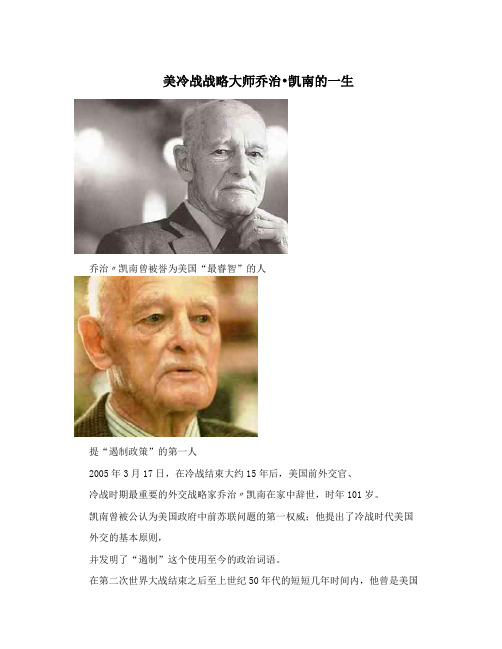
美冷战战略大师乔治•凯南的一生乔治〃凯南曾被誉为美国“最睿智”的人提“遏制政策”的第一人2005年3月17日,在冷战结束大约15年后,美国前外交官、冷战时期最重要的外交战略家乔治〃凯南在家中辞世,时年101岁。
凯南曾被公认为美国政府中前苏联问题的第一权威;他提出了冷战时代美国外交的基本原则,并发明了“遏制”这个使用至今的政治词语。
在第二次世界大战结束之后至上世纪50年代的短短几年时间内,他曾是美国外交界的红人,但因为他无法适应美国的官场,最终被迫离开了外交界。
凯南一生的大部分时间都是在研究外交史、撰写回忆录,他撰写了17部著作,其中两部获得普利策奖;但他自己更愿意成为一个文学家,一个诗人或者小说家。
文字:韩杨在塑造冷战时期美国外交政策方面,凯南的作用超过了同时代的其他所有美国外交官。
而真正让他成为历史名人的则是一份电报和一篇文章。
1946年,当时任职于美国驻莫斯科大使馆的凯南,在发给国内的一份电报中勾画出了美国对前苏联政策的基本框架,后来这些政策一直指导着美国的对苏政策,直到将近50年后前苏联解体。
在这份被称为“长电报”的著名文件中,凯南写道,前苏联的扩张必须加以对付,而对付的办法则主要是通过外交、政治和经济手段,军事手段可以利用,但不应成为主要手段。
这份电报可以说是凯南的“成名之作”。
后来,他在回忆录中也得意地写道:“我的名声由此确立。
”这份电报也被称为美国外交史上最重要的一份电报。
1947年,在“长电报”的基础之上,凯南又在美国顶级外交刊物《外交季刊》上以“X”先生的身份发表文章《苏联行为的根源》,第一次为他的对苏政策取名“遏制”。
遏制政策由此成型,并贯穿整个冷战时期。
而凯南的名字也因为“遏制”政策被历史牢牢记住。
对凯南来说,1946年至1947年或许是他外交官生涯中最为兴奋的时期。
而在此之后,他接连遭遇挫折,以至在1953年被迫辞官回家,离开外交界。
生于1904年的凯南,1925年从普林斯顿大学毕业后,就参加了美国国务院的考试,并顺利进入驻外事务处。
